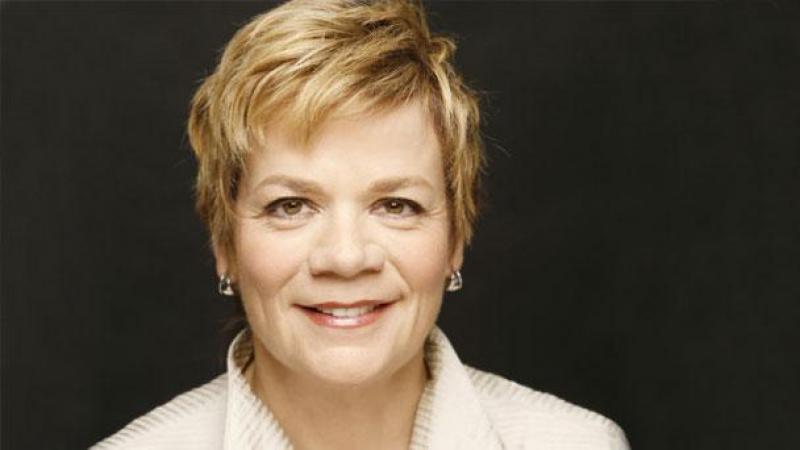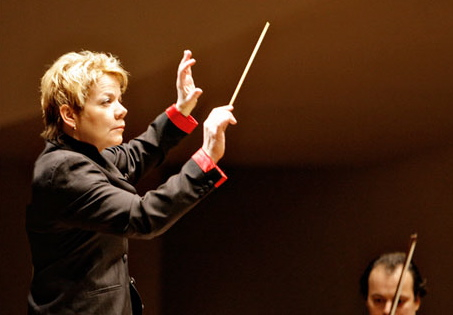Ohlsson, LPO, Alsop, Royal Festival Hall | reviews, news & interviews
Ohlsson, LPO, Alsop, Royal Festival Hall
Ohlsson, LPO, Alsop, Royal Festival Hall
Decidedly muted American roadtrip for the Rest Is Noise Festival

The Southbank Centre’s The Rest is Noise Festival has reached the American leg of its year-long tour through 20th century music, and with it safe musical ground. In the second of three concerts with the LPO, American conductor Marin Alsop showcased the two equally appealing sides of America’s musical history: its cleanly-scrubbed, western classical face in Copland and Ives, and the grubbier, jazz-infused gestures of Joplin and Gershwin.
Alsop (pictured below) is the real deal - a no-nonsense musician with a flair for texture and a real affinity for this generous, rhythmic repertoire. Her little educational segments before each work (a regular feature of the festival) were brisk and funny and resisted the urge to sprawl (ahem, Jurowski). It’s a shame then that the LPO were not on form, tired perhaps from their tough schedule which sees them performing solely 20th century repertoire this season.
Ohlsson is a difficult performer to get wildly excited about
The bold opening clarinet sally of Gershwin’s Rhapsody in Blue failed to shimmy or show any leg, and things went decidedly squiffy as the phrase progressed. Brass ensemble was a contradiction in terms, the big rallentando into the big finale spattered and snagged, and only the ululating, throaty husk of a muted trumpet redeemed things. Soloist Garrick Ohlsson is a supremely undemonstrative pianist which here played neatly into the drama, setting his effortless cool against the strivings of the orchestra. But he’s a difficult performer to get wildly excited about, so self-contained is his approach.
 In Copland’s Piano Concerto it was Ohlsson’s turn to play straight man to his orchestra’s deep jazz cats. The writing of this early work is wilfully unvirtuosic, luring the orchestra into a dialogue on the piano’s own monochrome terms. Jazz is here certainly, but only of the French-cigarette-smoking, existentialist-philosopher-reading variety. There’s some gorgeously idiomatic wind writing, and the LPO’s players turned dramatic ensemble for a sequence of carefully-characterised cameos that supplemented the colours that Copland denies his piano part.
In Copland’s Piano Concerto it was Ohlsson’s turn to play straight man to his orchestra’s deep jazz cats. The writing of this early work is wilfully unvirtuosic, luring the orchestra into a dialogue on the piano’s own monochrome terms. Jazz is here certainly, but only of the French-cigarette-smoking, existentialist-philosopher-reading variety. There’s some gorgeously idiomatic wind writing, and the LPO’s players turned dramatic ensemble for a sequence of carefully-characterised cameos that supplemented the colours that Copland denies his piano part.
Charles Ives’s Three Places In New England is a contemporary classic, its three programmatic movements unfolding as a brightly contrasting triptych of landscape scenes. The filmy textures of the first movement failed to peg themselves successfully to any kind of cumulative narrative, so the arrival at the broadly comic second movement (with its brilliant parody of amateur bandsmen) was less startling that it should have been. Strings felt tentative and underpowered and we missed something of vulgarity in this central section. Only the final movement gained the warmth, the hazy affirmation of Ives’s vision.
Rounding out the programme was a suite taken from Scott Joplin’s opera Treemonisha. It’s a piece well worth staging, but in excerpts (and against such rivals as Copland and Gershwin) it didn’t quite justify its place here. The tunes are broad, the rhythms catchy, but the whole never quite caught that grinning energy that this music needs to sell itself.
A missed opportunity here for the LPO as American ambassadors, but Alsop’s preambles alone would make it worth risking their final concert in this sequence.
rating
Share this article
Add comment
The future of Arts Journalism
You can stop theartsdesk.com closing!
We urgently need financing to survive. Our fundraising drive has thus far raised £49,000 but we need to reach £100,000 or we will be forced to close. Please contribute here: https://gofund.me/c3f6033d
And if you can forward this information to anyone who might assist, we’d be grateful.

Subscribe to theartsdesk.com
Thank you for continuing to read our work on theartsdesk.com. For unlimited access to every article in its entirety, including our archive of more than 15,000 pieces, we're asking for £5 per month or £40 per year. We feel it's a very good deal, and hope you do too.
To take a subscription now simply click here.
And if you're looking for that extra gift for a friend or family member, why not treat them to a theartsdesk.com gift subscription?
more Classical music
 First Person: Manchester Camerata's Head of Artistic Planning Clara Marshall Cawley on questioning the status quo
Five days of free events with all sorts of audiences around Manchester starts tomorrow
First Person: Manchester Camerata's Head of Artistic Planning Clara Marshall Cawley on questioning the status quo
Five days of free events with all sorts of audiences around Manchester starts tomorrow
 Goldscheider, Brother Tree Sound, Kings Place review - music of hope from a young composer
Unusual combination of horn, strings and electronics makes for some intriguing listening
Goldscheider, Brother Tree Sound, Kings Place review - music of hope from a young composer
Unusual combination of horn, strings and electronics makes for some intriguing listening
 theartsdesk Q&A: composer Donghoon Shin on his new concerto for pianist Seong-Jin Cho
Classical music makes its debut at London's K-Music Festival
theartsdesk Q&A: composer Donghoon Shin on his new concerto for pianist Seong-Jin Cho
Classical music makes its debut at London's K-Music Festival
 Helleur-Simcock, Hallé, Wong, Bridgewater Hall, Manchester review - moving lyricism in Elgar’s concerto
Season opener brings lyrical beauty, crisp confidence and a proper Romantic wallow
Helleur-Simcock, Hallé, Wong, Bridgewater Hall, Manchester review - moving lyricism in Elgar’s concerto
Season opener brings lyrical beauty, crisp confidence and a proper Romantic wallow
 Kohout, Spence, Braun, Manchester Camerata, Huth, RNCM, Manchester review - joy, insight, imagination and unanimity
Celebration of the past with stars of the future at the Royal Northern College
Kohout, Spence, Braun, Manchester Camerata, Huth, RNCM, Manchester review - joy, insight, imagination and unanimity
Celebration of the past with stars of the future at the Royal Northern College
 Jansen, LSO, Pappano, Barbican review - profound and bracing emotional workouts
Great soloist, conductor and orchestra take Britten and Shostakovich to the edge
Jansen, LSO, Pappano, Barbican review - profound and bracing emotional workouts
Great soloist, conductor and orchestra take Britten and Shostakovich to the edge
 Jakub Hrůša and Friends in Concert, Royal Opera review - fleshcreep in two uneven halves
Bartók kept short, and a sprawling Dvořák choral ballad done as well as it could be
Jakub Hrůša and Friends in Concert, Royal Opera review - fleshcreep in two uneven halves
Bartók kept short, and a sprawling Dvořák choral ballad done as well as it could be
 Hadelich, BBC Philharmonic, Storgårds, Bridgewater Hall, Manchester review - youth, fate and pain
Prokofiev in the hands of a fine violinist has surely never sounded better
Hadelich, BBC Philharmonic, Storgårds, Bridgewater Hall, Manchester review - youth, fate and pain
Prokofiev in the hands of a fine violinist has surely never sounded better
 Monteverdi Choir, ORR, Heras-Casado, St Martin-in-the-Fields review - flames of joy and sorrow
First-rate soloists, choir and orchestra unite in a blazing Mozart Requiem
Monteverdi Choir, ORR, Heras-Casado, St Martin-in-the-Fields review - flames of joy and sorrow
First-rate soloists, choir and orchestra unite in a blazing Mozart Requiem
 Cho, LSO, Pappano, Barbican review - finely-focused stormy weather
Chameleonic Seong-Jin Cho is a match for the fine-tuning of the LSO’s Chief Conductor
Cho, LSO, Pappano, Barbican review - finely-focused stormy weather
Chameleonic Seong-Jin Cho is a match for the fine-tuning of the LSO’s Chief Conductor
 Classical CDs: Shrouds, silhouettes and superstition
Cello concertos, choral collections and a stunning tribute to a contemporary giant
Classical CDs: Shrouds, silhouettes and superstition
Cello concertos, choral collections and a stunning tribute to a contemporary giant
 Appl, Levickis, Wigmore Hall review - fun to the fore in cabaret and show songs
A relaxed evening of light-hearted fare, with the accordion offering unusual colours
Appl, Levickis, Wigmore Hall review - fun to the fore in cabaret and show songs
A relaxed evening of light-hearted fare, with the accordion offering unusual colours

Comments
I must have gone to a
"Ohlsson is a difficult
I heard Marin Alsop conduct a